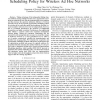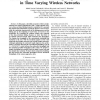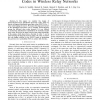357 search results - page 30 / 72 » Channel Diversity in Random Wireless Networks |
GLOBECOM
2007
IEEE
14 years 3 months ago
2007
IEEE
— 1 Taking advantage of the independent fading channel conditions among multiple wireless users, opportunistic transmissions schedule the user with the instantaneously best condi...
SPAA
2010
ACM
14 years 1 months ago
2010
ACM
In this paper we study a dynamic version of capacity maximization in the physical model of wireless communication. In our model, requests for connections between pairs of points i...
CORR
2006
Springer
13 years 8 months ago
2006
Springer
Abstract-- In this paper, a downlink scenario in which a singleantenna base station communicates with K single antenna users, over a time-correlated fading channel, is considered. ...
GLOBECOM
2007
IEEE
14 years 3 months ago
2007
IEEE
— In this paper, we consider the design of synchronization-aware distributed space-time codes, which we denote as diagonal distributed space-time codes (DDSTC), for N relay nodes...
CORR
2007
Springer
13 years 8 months ago
2007
Springer
— The fairness of IEEE 802.11 wireless networks (including Wireless LAN and Ad-hoc networks) is hard to predict and control because of the randomness and complexity of the MAC co...



